- Home
- Robert Goddard
Beyond Recall Page 2
Beyond Recall Read online
Page 2
The last of the Pencavels was killed on the Somme. When his widow remarried in 1920, she put the house up for sale. Its buyer was a prodigal son of the city, my great-uncle Joshua Carnoweth, who’d just returned from a long and self-imposed exile in the gold fields of North America with a greater fortune than anyone had thought him capable of amassing. The purchase of Tredower House was both a rebuke to his doubting contemporaries and a declaration that his wandering days were over. He was forty-seven; too young, I’d have said, for subsiding into Cornish squiredom. But he had reasons enough, and no way of knowing that those reasons would one day conspire to destroy him.
I was glad, in a way, that the house had become a busier, brasher place since it had ceased to be my home. A modern conference suite to the rear, a car park in what had been the orchard and a scatter of signposts and security lights proclaimed its commercial identity in a way that subdued more personal memories without ever quite erasing them. Even weddings had become a regular branch of the business, though none of the receptions laid on for clients could ever have required a larger pinker-draped golder-ribboned marquee than the one I glimpsed through the trees as I sped past in the Stag that morning, en route to the church.
The ceremony went off flawlessly, without so much as a fluffed line, and was followed by a mass transit to Tredower House. With so many people eager to congratulate the bride and her grandparents, Pam distracted by her responsibilities as hostess and Trevor having for once a good excuse to ignore me, I drifted with little resistance to the margins of the event. An hour at least of champagne and canapes loomed ahead. For a reformed alcoholic on edgy terms with his relatives, this promised to be a torturous interlude. So I took myself off, as discreetly as possible, to a shady corner of the lawn, propped myself against the croquet bench that had been moved out of harm’s way beneath the beech tree, and gazed back at the party. Laughter mixed ripely with the jazz band’s lazy melodies in the still summer air.
Colourful outfits swirled like a slowly wound kaleidoscope in the hazy sunshine. Light sparkled on champagne flutes. Joy, pleasure and satisfaction mingled. And trying desperately not to feel dog-in-the-mangerish, I toasted them all with orange juice.
My parents, along with the bride and groom, were out of sight within the marquee. They’d still be busy greeting the guests, and I knew they’d be doing it with tireless aplomb. Gran had trained my father well in the social obligations that went with the status she’d carved out for him. She’d taught him to project a bluff glad-handed image of himself that had smoothed his path in the world of big business and local politics. It was an image old age seemed only to have strengthened. You needed to have been close to him to see and know a different kind of man.
But my mother had been closer than anyone for the past fifty years and I knew her devotion to him was no act, so I reckoned there must always have been more that was genuine in him than I’d been prepared to admit.
I suspected Gran had manoeuvred them into marriage in the first place.
The provision of a wife for her son and a mother for her grandchildren wasn’t something she’d have left to chance, that’s for certain. But, if so, her manoeuvring had paid off, as usual. I’d never had cause to doubt that my parents loved each other. The only question in my mind was whether they truly loved me.
Pam would have dismissed such an idea as nonsense, and with good reason. Her upbringing had turned her into a practical and affectionate woman, with a daughter who was a credit to her. Tabitha had her mother’s shrewdness and clarity of vision, as well as her fine-boned looks and graceful bearing.
I caught sight of the father of the bride then, moving artfully through the crowd. Middle age had improved Trevor, smoothing out the gaucheness and insecurity I remembered from when Pam had first introduced me to him. The public relations side of hotel management was something he excelled in. It clearly agreed with him. He drank heavily, without showing any ill effects, which naturally I hugely resented, while secretly regarding him as a fool, which was, in turn, what he probably thought me. And both of us could have called on some substantial evidence to support our claim.
I don’t think I heard anything to make me look round at that moment.
Maybe I sensed that I wasn’t the only one observing the scene, that a change had occurred, a thread been pulled from the fabric of the day.
I’m not sure. It doesn’t matter, anyway. The fact is I did look round, and saw a man standing beneath the stretching branches of the old horse chestnut that dominated the north-east corner of the garden.
He was about my height, but thinner, with matted greying hair and beard. His clothes were ragged and dusty, threadbare jeans and an open-necked check shirt worn beneath an old mackintosh. The mac was what made me think he must be a tramp. Who else would wear one on such a sunny day? He was trembling too, which couldn’t be from the cold.
His face was in shadow, but I had the impression he was looking at me rather than the wedding party spilling across the lawn.
I stood upright and rounded the bench. As I did so, he took a step towards me, a step that carried him into a pool of sunlight. I saw his face clearly for the first time. If he was a tramp, he’d not been on the road long. His eyes weren’t dull enough, his skin wasn’t rough enough. I felt instinctively that I knew him, but I didn’t trust the instinct. His mouth twitched. A smile or a grimace, it was hard to tell which. He mumbled something. Even without the noise of the reception, it would have been difficult to catch. But catch it I did.
“Chris.” My name. Spoken by somebody I could no longer take for a stranger.
“Do I know you?” I said, frowning.
Then he did smile, lopsidedly and familiarly. He glanced up at the thick bough of the horse chestnut above his head, raised his arms slowly towards it and moved them back and forth, miming the action of someone propelling himself on a swing suspended from the branch. I felt my mouth drop open, remembering how I’d swung from that very branch as a child, how my boyhood friend Nicky Lanyon and I had
“Nicky?” I should have known at once. Between the ages of seven and eleven, I suppose we’d spent more time with each other than with any other single person. We’d been the most inseparable of pals for those four years straddling the end of the war. Chris and Nicky; Nicky and Chris. But all that had ended in the summer of 1947. All that and much more. “Is it you?”
I hadn’t seen him for thirty-four years. I’d done my very best to forget him. But forgetfulness, I realized as I looked at him, was only a pretence. I remembered him as if shabby middle age were merely a disguise he’d cast off at any moment, as if the eleven-year-old boy he’d once been could step suddenly into view, hair shorn, eyes sparkling, face tanned by a Cornish summer, shirt hatched from some woodland scramble, trousers grass-stained, knees muddied, socks rumpled, shoes scuffed; as if every fragment of a lost friendship could be miraculously gathered and reassembled. There was a moment a fleeting instant when I was happy, so very happy, to see him. Then guilt and caution and something like contempt rushed to defend my part in his ostracism. I felt myself stiffen and draw back. Then saw him flinch, as if he too had watched the portcullis slam down between us.
“What are you doing here?” My tone had altered without my meaning it to. It must have sounded cold and stiff and forbidding.
“Came to see…” He spoke slowly, slurring the words. His gaze lingered on me with a strange mild curiosity. “Came to see … you.”
“Me?”
“Read … about this.” He tugged what looked like a scrap of newspaper from the pocket of his mac and held it up. I took it for a cutting from the local paper, and guessed Trevor might have inserted some notice about the wedding. But what was Nicky’s interest in it? He didn’t even live in the area. Did he? “Knew … you’d be here.”
“You’ve been … waiting for me?”
“Mum’s dead.”
“Your mother? I’m sorry. I.. .”
“My sister too.”
Nicky’s y
ounger sister, Freda, had died of whooping cough during the war. Mentioning her death, of which he must have known I was aware, seemed pointless, if not perverse, but I assumed it had some significance only he could understand. “What do you want, Nicky?”
“Mum and Dad… together.”
“Perhaps they are now.”
“Not with me.”
“When did your mother die?”
“Six months… ago.” He stuffed the scrap of paper back into his pocket. “Cancer.”
“I’m sorry to hear that.”
His gaze hardened. “Why should you be?”
“Because I liked her.”
“Liar.”
“It’s true.”
“Liar!” He shouted the word this time, his face flushing with a rush of anger. “Liar!”
“Calm down, for God’s sake.”
“Why … should I?”
“This is my niece’s wedding day. We don’t want any …
unpleasantness.” I regretted the words as soon as I’d used them. His own life had contained more than enough unpleasantness, and it was certain he’d wanted none of that either. “What are you… doing these days?”
“Looking.”
“For what?”
“The answer.”
“To what?”
“You know.”
“No. I don’t.”
“But do you … know the answer? Do you, Chris?”
“The answer to what?”
“Who killed my father?” The question was so bizarre, yet so evidently sincere, that I simply stared at him in response, trying to read in his despairing gaze the harshness of the road he’d trodden since the summer of 1947. “Who did it?”
“What the hell’s going on?” Trevor’s voice, raised and peremptory, cut through the seclusion of our exchanges. I turned round and saw him striding towards us, drink and disapproval darkening his expression.
“What’s the shouting about?”
“Nothing. It’s all right. There’s no need ‘
“Who’s he?” Trevor glared past me at Nicky. “Looks like some bloody dosser.”
“Nothing of the kind. I can ‘
“This is a private party,” said Trevor, cutting across me. “Get the hell out of here.”
“Hold on, Trevor. You don’t understand.”
But lack of understanding had never restrained my brother-in-law. He marched towards Nicky, one arm gesturing in the direction of the road.
Nicky stumbled back, raising his hands and lowering his head submissively. Sorrow and guilt lanced into me at this show of weakness. I called his name, but it was too late. He turned and began to run, stooping beneath the branches, heading for the part of the wall we’d often scaled together as boys, with Trevor in token pursuit. It was no contest. Nicky ran like a fox before the hounds, vanishing into the deeper shade of the trees. In my mind’s eye, I saw him climb by the remembered footholds up onto the wall, drop down the other side, descend the bank to the pavement below, then jog away along the road.
“The bastard’s gone,” panted Trevor as he rejoined me by the bench.
“Legged it.”
“So I see.”
“You should have sent him packing yourself. Drunks and derelicts. You can’t afford to give them any encouragement.”
“He was as sober as I am, and no derelict.”
“You talk as if he was a friend of yours from Alcoholics Anonymous.”
“A friend? Yes. Well, as a matter of fact he is.” I sighed. “Or was.”
“A friend of yours? Should I know him, then?”
“In a sense, you do.”
“Really? What’s his name?”
“Nicky Lanyon.”
“Lanyon?”
“Yes. Son of Michael Lanyon.”
“What? The man who…”
“That’s right. The man they hanged for Uncle Joshua’s murder.”
“The man they hanged for Uncle Joshua’s murder.” The phrase lodged in my mind, with dormant recollections clinging to it like cobwebs on a musty old signpost. Trevor hadn’t known us in 1947, hadn’t even lived in Cornwall. To him the Lanyons were just an irrelevant piece of second-hand history. Even so, he didn’t want their name mentioned on a day set aside to celebrate our family. He was aware that the Lanyons represented nothing so substantial as a threat, but something unsatisfactory, unresolved and faintly disturbing. Nicky’s presence in Truro didn’t worry him, but he’d have preferred him to be somewhere else. Anywhere else, in fact.
“Let’s keep this to ourselves, shall we, Chris?” he said as we walked back across the lawn. “It’s the last thing Melvyn and Una need to hear about on their anniversary.” The reference to my parents was a direct appeal to my sense of family responsibility. But I suspected that Mum and Dad weren’t the people he was really worried about, as he tacitly went on to admit. “And I don’t want anything to spoil the day for Tabs.”
“Would she even recognize the name?”
“Probably not. But I’d like to keep it that way.”
“What about Dominic? Does he know how we inherited this place?”
Trevor pulled up sharply. I stopped as well and turned to look at him.
His expression suggested that he was trying hard not to be riled. “In a couple of hours, my daughter and son-in-law will be on their way to Mauritius for their honeymoon. Is it asking too much for you to do your best to make sure they get a happy send-off?”
“No. It’s not.” I gave him a man-to-man smile. “Let’s forget about Nicky. I reckon we’ve seen the last of him.”
I did rather well, if I say so myself. I discovered the secret of how to amuse Dominic’s mother, nearly sold his father the Bentley Continental then taking pride of place in my showroom back in Pangbourne, made an impromptu speech wittily blending the role of grateful son and gratified uncle, and generally threw myself enthusiastically into the proceedings. I saw Mum and Dad share at least one glance of pleasurable surprise at my contribution and was happy they shouldn’t have the faintest idea what lay behind it. I was trying my damnedest to shake off the guilt and shame that Nicky’s sudden appearance had left me with. I was trying to shake them off before I had too long to wonder why I should be prey to them in the first place.
By late evening, I’d more or less succeeded. Tabitha and Dominic had departed for Mauritius, and the disco laid on for their friends had begun to wind down. My mother had started to tire, but my father still seemed to be enjoying himself, so I suggested a frame of snooker before they went home, knowing how much he relished beating a younger opponent. He rose to the challenge and we took ourselves off to the billiards room, mercifully distant from the beat of the band.
The room was kept up for the use of guests, but was pretty much as it had always been, with a full-size table, original leather seating and faded hunting prints around the walls. The setting made me think of Uncle Joshua, despite his disdain for all things sporting. Even so, it was the nostalgic bent of my father’s conversation, as he plodded round the table building a break, that undermined my resistance to memories of Nicky Lanyon and his father.
“It’s been a great day. Really has. Your mother’s had a wonderful time. So have I. Far cry from our wedding day, I can tell you. Oh yes. Very different.”
“In what way?”
“Well, it was the middle of the Depression then, wasn’t it? We were living in Cardew Street. Didn’t move to Crescent Road until after Pam was born. And the shop was really only ticking by. There wasn’t money to throw around taking honeymoons on the other side of the world. Your mother and I had three days in Penzance. Three days. Can you believe it?”
I chuckled. “I think so.”
“As for the reception, that was in a function room at the Royal. No marquee on the lawn up here for us.”
“But Uncle Joshua was at the wedding. I’ve seen him in the photographs.”
“Oh, he was there all right, looking down his nose at me and your mother.”
&nbs
p; “He was never the type to ‘
“What would you know?” Dad straightened up from squinting along his cue to look at me. “You never saw the hard side of his nature. He could have done something more for us than just turn up to the wedding, couldn’t he? He had money to spare and a big house here to rattle around in. But did he ever offer to help us out? Did he hell.”
“He helped us in the end, though, didn’t he? Inadvertently, I mean. He got himself murdered by the man who stood to inherit everything. The money and the house.”

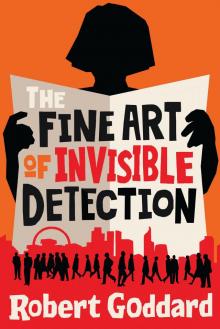 The Fine Art of Invisible Detection
The Fine Art of Invisible Detection One False Move
One False Move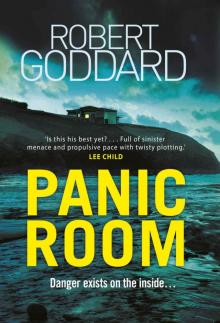 Panic Room
Panic Room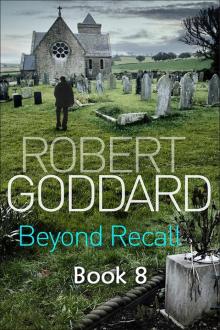 Beyond Recall
Beyond Recall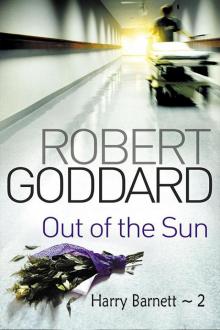 Out of the Sun
Out of the Sun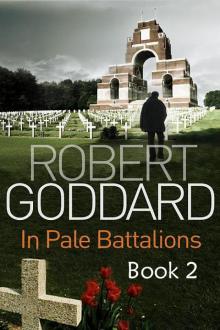 In Pale Battalions - Retail
In Pale Battalions - Retail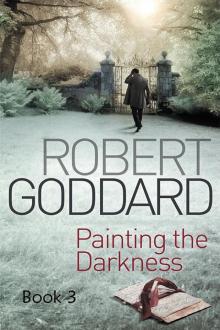 Painting The Darkness - Retail
Painting The Darkness - Retail The Corners of the Globe
The Corners of the Globe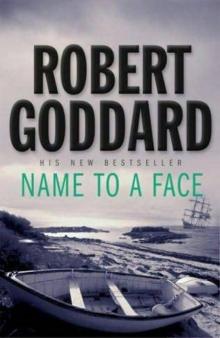 Name To a Face
Name To a Face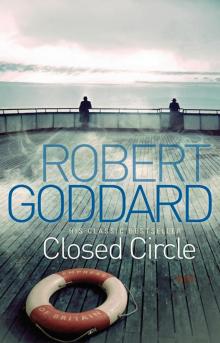 Closed Circle
Closed Circle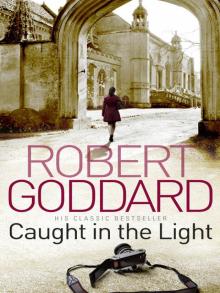 Caught In the Light
Caught In the Light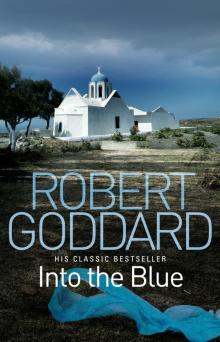 Into the Blue
Into the Blue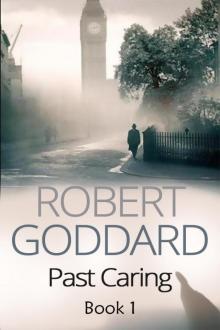 Past Caring - Retail
Past Caring - Retail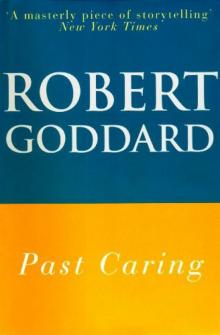 Past Caring
Past Caring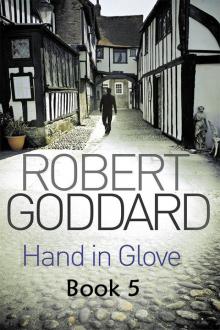 Hand In Glove - Retail
Hand In Glove - Retail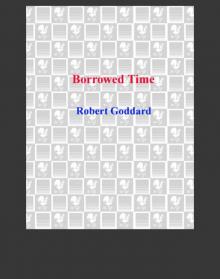 Borrowed Time
Borrowed Time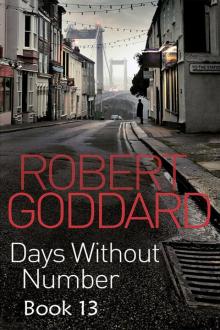 Days Without Number
Days Without Number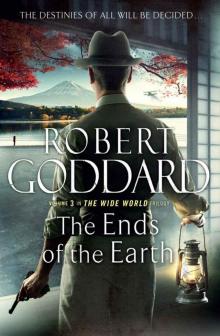 James Maxted 03 The Ends of the Earth
James Maxted 03 The Ends of the Earth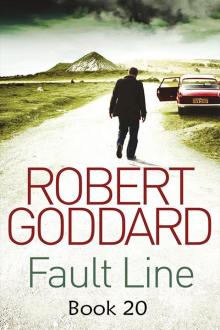 Fault Line - Retail
Fault Line - Retail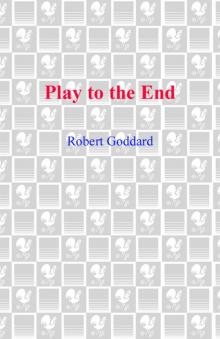 Play to the End
Play to the End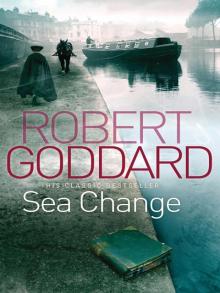 Sea Change
Sea Change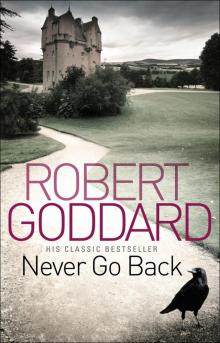 Never Go Back
Never Go Back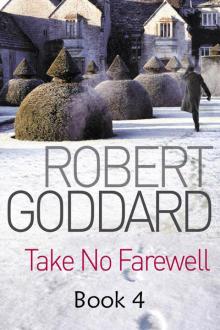 Take No Farewell - Retail
Take No Farewell - Retail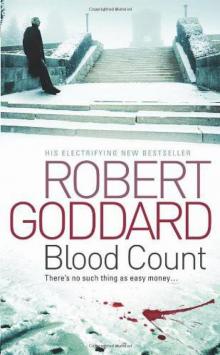 Blood Count
Blood Count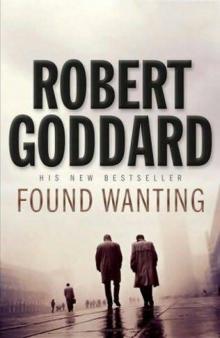 Found Wanting
Found Wanting Sight Unseen
Sight Unseen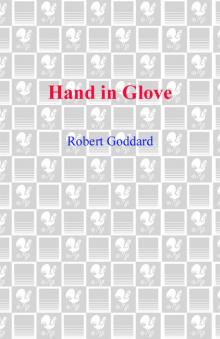 Hand in Glove
Hand in Glove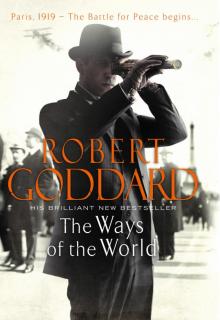 The Ways of the World
The Ways of the World